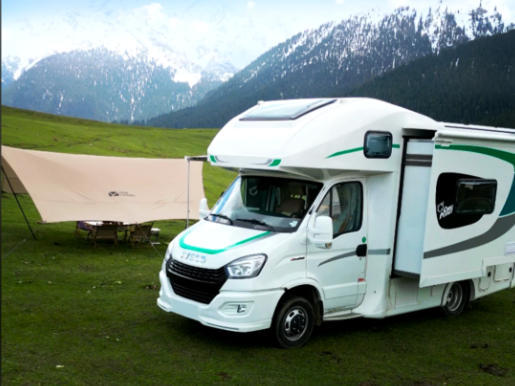
The RV Material Revolution: How PMI Foam is Leading a New Era of Lightweighting and High Strength
PMI Foam: The Key to Enhancing RV Performance and Comfort
With the growing popularity of outdoor adventures and "mobile living," the market demand for Recreational Vehicles (RVs) and Motorhomes continues to expand. However, RV manufacturers face a core challenge: how to achieve maximum lightweighting while ensuring structural robustness and superior thermal insulation. Traditional RV construction relies on wood, aluminum frames, and lower-performance foam cores (like EPS/XPS). These materials often result in excessively heavy RVs with poor fuel efficiency, and they are susceptible to moisture and corrosion, leading to a limited lifespan.
To address these pain points, a high-performance engineering material—PMI Foam (Polymethacrylimide foam)—is becoming a game-changer in RV manufacturing. Known for its ultra-lightweight, high specific strength, excellent heat resistance, and closed-cell structure, PMI foam is being widely adopted in the sandwich composite structures of RV bodies, floors, and partitions, ushering in a new chapter in RV design.
Five Core Advantages of PMI Foam in RV Applications
1. Extreme Lightweighting and Efficiency Improvement
The central advantage of PMI foam lies in its extremely low density. Compared to traditional wood cores or aluminum frames, PMI foam, when used as the core of a sandwich structure, enables significant weight reduction for the RV. The saved weight directly translates into:
- Higher Fuel Efficiency: Lowering operating costs and aligning with environmental trends.
- Increased Payload: Allowing for more capacity for water, fuel, luggage, and equipment.
- Better Driving Dynamics: A lighter body means better handling and shorter braking distances.
2. Outstanding Structural Strength and Durability
Despite being light, PMI foam possesses high rigidity and high compressive strength. When combined with face materials like fiberglass, carbon fiber, or aluminum sheets, the resulting composite panel exhibits exceptionally high flexural stiffness. This structure effectively resists vibrations and twisting during travel, ensuring the RV remains undistorted and crack-free over long distances and on challenging terrains, thus significantly extending the RV's service life.
3. Superior Thermal and Acoustic Insulation
The comfort of an RV is closely linked to its insulation performance. The micro-closed-cell structure of PMI foam gives it excellent thermal insulation properties. It effectively prevents heat transfer, meaning the RV interior stays cool in the summer and warm in the winter, reducing the energy consumption of air conditioners and heaters. Furthermore, PMI foam also offers good sound absorption, providing occupants with a quieter, more comfortable rest environment.
4. Complete Moisture and Corrosion Resistance
Traditional wooden structures are a primary cause of RV aging and damage, being particularly vulnerable to moisture and rot. PMI foam is a thermoplastic polymer with a completely closed-cell structure, which means it does not absorb water, does not corrode, and is impervious to mold. This is crucial for RVs exposed to various weather conditions over time. It guarantees that the structure remains stable in humid environments, fundamentally solving the problem of RV leaks and structural decay.
5. High Temperature Stability and Ease of Processing
PMI foam exhibits excellent high-temperature resistance, preventing deformation or decomposition during the composite curing process and ensuring the manufacturing quality of the sandwich panel. Simultaneously, PMI foam cores can undergo thermoforming and Computer Numerical Control (CNC) precision machining, making them easy to cut into complex curved surfaces and shapes. This facilitates the manufacturer's ability to integrate various wiring and piping, enabling modular, highly integrated RV designs.
Conclusion
As a future-oriented high-performance core material, PMI foam is driving the RV manufacturing industry away from traditional "heavy" structures towards "high-performance lightweighting." It not only enhances the RV's durability, safety, and energy efficiency but also fundamentally improves the user's travel experience, heralding a new era of RV design.

PMI foam
Latest News




